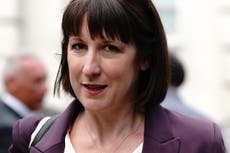Why the Tories should be terrified of Labour’s tax policy
The Conservatives like to attack the Labour Party of their dreams – one which would go on a tax-raising, borrowing and spending binge – but Keir Starmer and Reeves stubbornly paint a very different picture, writes Andrew Grice


Rachel Reeves’ decision to rule out a wealth tax has increased the pressure on Rishi Sunak to reduce taxes. The Conservatives like to attack the Labour Party of their dreams – one which would go on a tax-raising, borrowing and spending binge – but Keir Starmer and Reeves stubbornly paint a very different picture. Ruling out an increase in capital gains tax and the top rate of income tax and the introduction of a “mansion tax” doesn’t fit the Tory script.
Right-wing Tory MPs are grumbling that Sunak’s government looks no different to Labour – as Reeves intended on tax, while insisting Labour has different spending priorities – and are warning that Sunak will have no chance of avoiding a general election defeat without putting “clear blue water” between the two parties on tax.
The problem: the fiscal outlook is even worse than when Liam Byrne, Labour’s outgoing chief Treasury secretary in 2010, unwisely left a note to his successor saying: “I’m afraid there is no money.” More immediately, Treasury officials are warning that tax cuts in Jeremy Hunt’s autumn statement in November could undermine the fight against inflation.
So impatient Tory backbenchers will have to wait until the Budget next March, the last before the general election. The chancellor will find a way to conjure up some tax reductions by then, and many Tory MPs will be disappointed if he doesn’t lop at least 1p off the 20p basic rate of income tax.
Instead, Hunt should listen to Tory advisers urging him to abolish stamp duty on property purchases. It is hated and clogs up the housing market. Fewer homes are bought and sold; people find it harder to move to take up a new job and to move up the housing ladder, while many over-60s live in bigger houses than they need because it costs so much to move.
The change would be expensive; the tax raised about £17bn in the last financial year. But it could be phased out rather than scrapped in one go. It currently applies to properties worth more than £250,000 (or £425,000 for a first-time buyer). For starters, Hunt could raise the £250,000 threshold to £700,000, so only the rich would pay it until it was eventually abolished – perhaps by the end of the next five-year parliament.
Crucially, the move would give the Tories a route to winning back the many under-50s who have turned their backs on them. “This is the best way for us to tackle inter-generational inequality,” one Tory insider told me. “If we don’t, we will pay a heavy price.”
Abolishing stamp duty would be a much better bet for the Tories than killing off inheritance tax, as some of their MPs want; Labour would brand it a “tax cut for the rich.”
Depressingly, both main parties will probably say one thing on tax before the election and do another afterwards. However hard they try to mask it with headline-grabbing diversions, the total tax burden will increase to avoid politically unacceptable cuts in public services. As the Institute for Fiscal Studies said last week: “Without tax rises, UK public service and benefits provision will not simply tread water, it will deteriorate. Unless levels of tax increase substantially, a reduction in the scope of the public services that the British state provides is likely inevitable.”
Today it emerged that NHS England’s workforce plan will cost £50bn and that health spending could rise from £156.1bn to £265.5bn by 2036–37.
Another headache is that the government’s debt interest payments have risen from £36bn in 2019-20 to £103bn amid higher rates, which could be with us for some time yet.
According to YouGov, more people would prefer any spare money to be spent on improving public services (44 per cent) than cutting taxes (29 per cent) or reducing debt (15 per cent). More than half (54 per cent) think it unrealistic for the government to reduce taxes, while 25 per cent believe it can.
Despite such views, the Tories retain their outdated obsession with cutting tax. But any reductions will be a mirage. A 1p tax cut, costing about £6.5bn a year, would not compensate for the huge “stealth tax” imposed by freezing allowances, which will bring in an eventual £29bn a year – probably the biggest tax hike in history, though that’s not quite how the government bills it.
Reeves’ dramatic-sounding pledge might yet be overtaken by events; some Labour figures whisper about a scenario in which an incoming Starmer government says “the Treasury’s books are even worse than we thought,” puts up taxes to rescue public services and blames the move on the Tories’ neglect while it still can.
On tax, the Tories and Labour deserve each other, while voters deserve a bit more honesty.
Join our commenting forum
Join thought-provoking conversations, follow other Independent readers and see their replies
Comments


Bookmark popover
Removed from bookmarks